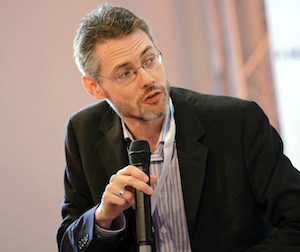Hello. You don’t know me, and I probably don’t know you – but it’s great to meet you here in the first Radio Tomorrow (TM) column.
Whether it’s Bangkok, Singapore, Hong Kong or Malaysia, every time I’ve spent a while in Asia, I’ve been struck by the amazing breadth of radio here.
A few years ago, I spent Christmas in Hong Kong, braving the unusual cold to find an AM radio to pick up the BBC World Service (and watching others walk around the many islands with a little portable radio of their own).
In Bangkok, sometimes a challenging environment for radio, I’ve been welcomed by a variety of new and old friends; and in a conference in Indonesia a few years ago I was impressed at meeting one of the bosses of a new station in Myanmar. There’s so much passion for what radio can do.
I speak in radio conferences about radio’s future: and I also get to see a lot about what’s going on in radio across the world. At the end of last year I had a rather ridiculous month of travelling to Los Angeles in the US, Moscow in Russia, Hilversum in The Netherlands, Biel in Switzerland and Berlin in Germany. I could write a travel column too.
Radio in most of these places is doing well: strong businesses, with audience figures that are stable in most cases and increasing in many. Radio in Moscow is most popular with young audiences, not with the old. In the Netherlands, radio’s slick, yet reinventing itself with video and other services. In Switzerland, the future’s very much DAB+ shaped, for some stations at least.
What ties all these places together is that broadcasters are keen to understand what’s going on across the rest of the world. They steal the best ideas from everyone else, and keep innovating and trying new things. I’d like to help you steal some ideas from others – particularly in the area of radio’s future.
My background is as a radio creative technologist. I’ve worked as a presenter and copywriter in UK radio, and worked as Digital Director for the original Virgin Radio in London. During my time at Virgin, I launched the world’s first radio app for mobile phones – with technology from a Singaporean company, incidentally – and helped make Virgin the world’s most listened-to online radio station. I then spent a few years at the BBC, fixing the sound of their stations online. I’m now working for a variety of broadcasters across the world, helping them understand what’s next.
There’s a bunch of interesting, and fascinating, things that radio stations across the world are doing. Some are programming ideas and neat stunts; but others are ideas on how to use technology better, from websites to WhatsApp, from video to Viber, from personalisation to playlisting.
So, I’d like to bring the best of the world to this column. Hopefully this will be a repository of great ideas that you, or your digital team, might want to steal. In the first few weeks, I’ll talk about how to get your radio station be famous for the music it helps your listeners
discover; and how radio and mobile phones can really click together.
I’m honoured to be asked to do it, and I look forward to taking part in the conversations that I hope it starts. It’ll be great to meet you: and hear your suggestions.
First, however, I think there’s a glass of Singha to be drunk.
Stay tuned for another column from James next week.
is a radio futurologist, and is Managing Director of , a companion website to radioinfo and AsiaRadioToday.
He has served as a judge for a number of industry awards including the Australian Local Radio Awards, the UK , and the UK’s , where he has also served on the committee. He was a founder of the hybrid radio technology association .
James is one of the organisers of , the radio ideas conference each September, and is also on the committee of . He writes for publications including his own media.info, Radio World International and RAIN News.
James lives in North London with his partner and a two year-old radio-loving toddler. He very, very much likes beer.
Radio Tomorrow is a trade mark of Radioinfo Pty Ltd

